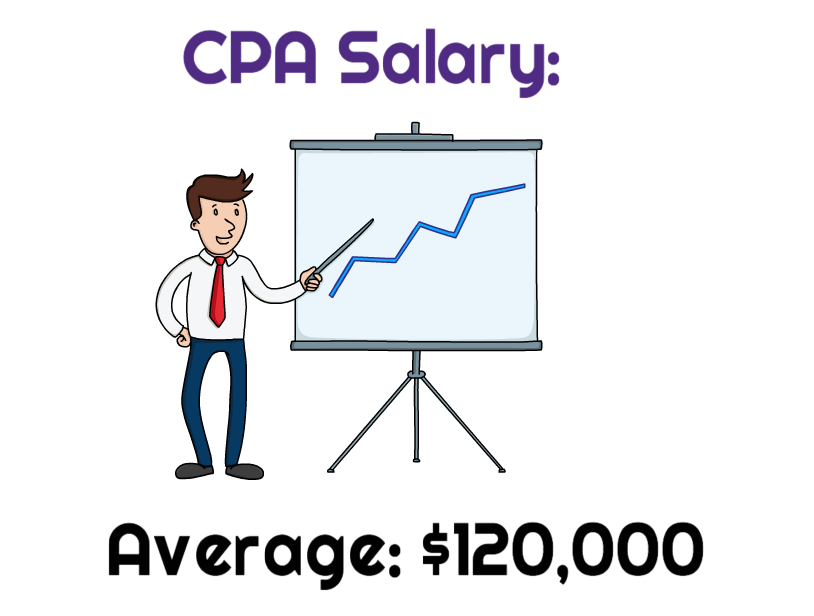“How much will I make if I get a CPA?” Is a common question we receive, and one that has a few layers of answers. To begin an attempt at answering this, it is paramount to understand that whether you’re just starting your career, or have several years of experience, a CPA license is a highly sought-after designation that will instantly add credibility to your professional opinion. Before deciding to enter the tumultuous experience that comes with studying for all four sections of the CPA exam, you should probably know the facts.

According to surveys provided by the (AICPA), a licensed CPA with less than one year of work experience should expect to earn an annual salary of approximately $66,000. The average CPA in the United States receives an approximate salary of $119,000.
Although these figures might not jump off the screen in the same way that salaries in certain finance fields might jump off the screen, it is important to note the intrinsic value that comes with a CPA license as well. The CPA license will provide you with a variety of options outside of the world of accounting. Although tax and audit professionals are highly in demand nationwide, a CPA license will enable candidates to make lateral moves into various professions all together. So, what types of jobs can CPA’s land you ask?
Public Accounting:
Public accountants serve large firms that provide businesses, individuals, not-for-profit, and governmental organizations with accounting services worldwide. Public accounting firms come in various sizes. Some are large that employ hundreds of thousands of accountants and some are as small as a few partners. The largest accounting firms also referred to as “the big four” consist of Ernst & Young (EY), Deloitte Touche Tohmatsu (Deloitte), Klynveld Peat Marwick Goerdeler (KPMG), and PricewaterhouseCoopers (PwC).
Quick Hitters:
How big are these firms? Gigantic. Deloitte has reported to sustain over 250,000 employees in 2019.
How much do these firms pay? Competitive salaries for entry-level professions. Big four jobs offer salaries between $45,000 and $60,000, depending on various factors such as location and department.
Some of the services that you could expect a public accounting firm to provide consist of:
- Tax preparation for businesses, individuals, and not-for-profit, and governmental organizations.
- Annual and quarterly financial statement preparation.
- Audit, review, compilation, and preparation engagements.
Whether public accounting is for you long-term, it provides a lot of great benefits such as great exposure to various industries and competitive salaries. Job security is also a huge plus at the big accounting firms. Those guys aren’t going anywhere!
Corporate Accounting:
Also referred to as private accounting, corporate accounting will allow accounting professionals to find their niche in an industry that better aligns with their interest and skillsets. Typically, corporate accounting jobs have a much better work life balance compared to public accountants and will often yield higher salaries long-term. According to Indeed, corporate accounting jobs have an average salary of $74,976 which is slightly higher than the base salary that you would find in public accounting.
Quick Hitters:
According to Indeed, corporate accounting jobs have an average salary of $74,976 which is slightly higher than the base salary that you would find in public accounting.
The big comparison in the accounting world is between public and corporate accounting. At the end of the day, corporate accounting is a smaller work environment, and unlike public accounting, the firms are generally not as massive. However, that doesn’t mean that they don’t come with great exposure. Some jobs that you can find in corporate accounting consist of:
- Budget analyst – will generally assist in the creation and implementation of a business budget. This is essentially a managerial accounting role.
- Forensic accountant – can mean a few different roles. Yes, most people think of forensics and will associate the role as a being employed by the FBI, however, there are various types of forensic accounting such as business interruption and property loss calculations.
- Staff accountant – is a very general role but within the corporate accounting arena this will generally mean that entry level accountants will be assisting in internal accounting functions.
Business Consulting
Business consultants will generally work with clients on strategizing new ways to either grow or cut back on expenditures. These tactics can grossly improve a client’s bottom line. Although this sounds like a lot of interesting work, there are a few things that you should be aware of before you jump at the first business consulting job you find. The biggest mistake job seekers make when shifting into a business consulting role is that they don’t know the difference between strategy consulting vs general business consulting. Working on the strategy side is what some of the larger, and more prestigious firms will often specialize in. Strategy consulting is what the majority of job seekers associate as pure consulting when in reality a lot of consulting jobs can consist of menial staff augmentation roles.
Quick Hitters:
Business consultants have an average salary of $73,269 according to PayScale, which is a pretty standard entry level position depending on location and specific company. Many business consultants attempt to find a specific niche or field to specialize in, which will enhance their prospects of more quickly climbing the corporate latter. Common jobs in the business consultant world will consist of:
- Associate consultant – is an entry level position in the consulting world. If consulting is what you want to pursue, then this is a good place to start, even if you have already worked several years and have obtained your CPA license. At the end of the day, consulting is entirely different from accounting, so starting at the bottom is not a terrible idea.
- Consultant – is generally a more senior role that oversees entry level associates and reviews final work products. Many consulting firms attempt to fill this role with a CPA background in order to ensure that those taking over more senior positions have a thorough understanding of the financial statements as they will be required to have more exposure with clients.
Bottom Line:
Any of these options can yield high salaries long-term, however, they all have relatively similar entry level salaries. If you are unsure about which avenue to take, we recommend reaching out to your inner network to better understand the life of each of these jobs before deciding as to what you really want.


